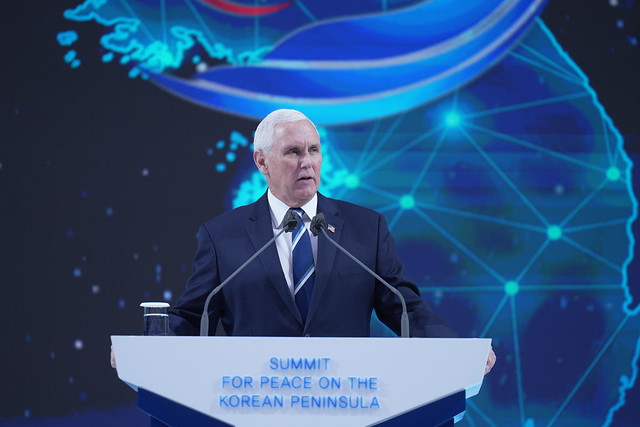Seoul, South Korea—The first plenary address was given by Hon. Mike Pence, U.S. Vice President (2017-2021). He said that in these times of the pandemic, every nation has been put to the test. Having led the White House Coronavirus Task Force, he learned that nothing is impossible when nations work together for the common good. He was proud to visit the Republic of Korea (ROK) as Vice President of the United States. Under the Trump administration, the alliance between the U.S. and the ROK was strengthened as never before and their trading relationship was improved. America reaffirmed its commitment to support the ROK and its alliances in the region with an unbreakable commitment to their common defense. Peace follows strength, while weakness arouses evil, for instance, the resurgence of missile tests and provocations from Pyeongyang. With the Abraham Accords, the Trump administration proved that much can be accomplished through a combination of strength and engagement. We also know, he said, that “no oppressive regime can last forever, for inside every human heart is an unquenchable fire that burns to be free, inside every human soul is an insatiable desire for freedom.”
Prime Minister Rt. Hon. Stephen Harper (2006-2015), Canada, said the Korean Peninsula is important not only for Northeast Asia but for the entire planet, because it involves the world’s major powers. While much of the world shut down because of the pandemic, the UPF has continued without pause or fatigue. It held Rallies for Hope, and on the 70th anniversary of the outbreak of the Korean War, pressing geopolitical issues were discussed in a number of webcasts. One in particular focused on the Middle East Peace Initiative and the impact of the Abraham Accords. Whenever we have cause to despair at the state of the world, we must take a moment to reflect on what the ROK has achieved since the end of the Korean War, for it has risen to become one of the most prosperous, peaceful and most progressive countries in the world. Rt. Hon. Harper hopes that the Democratic People’s Republic of Korea (DPRK) may someday enjoy the same progress, freedom and prosperity as the South. With pride he thinks back to the Canada-Korea Free Trade Agreement his government concluded in 2014. South Korea is now Canada’s seventh largest trade partner.
Mr. Jim Rogers, Chairman of Beeland Enterprises, described his three-year experience driving 250,000 kilometers through 116 countries. This gave him the perspective to see that Korea—and the Korean Peninsula—is probably going to be the next most exciting country in the world when the 38th parallel is opened. When it comes to demographics, Korea has one of the lowest birth rates in the world. In the south, to have a son is considered to be better than having a daughter. Once the 38th parallel is opened, there will be no more need for South Korean men to marry foreigners. The large number of girls in the north will make up for the shortage in the south. As to economics, he reminded us that Reverend Moon founded a car company in North Korea and that the UPF has other initiatives aimed at doing business in or with North Korea. Also, the undersea tunnel between Japan and Korea would allow the Korean Peninsula to become an extremely important transportation hub, provided the 38th parallel is opened. Just imagine the opportunities a connection to China’s One Belt One Road Initiative and the Trans-Siberian railroad would offer. The Korean currency has been very stable. However, South Korea has been building up huge amounts of debt these last 20-30 years, while North Korea has not. Opening the 38th parallel, and a new frontier, would boost the economy and moderate the overall debt on the peninsula. Just imagine what both North and South Korea could do if they did not have to spend billions on defense.

